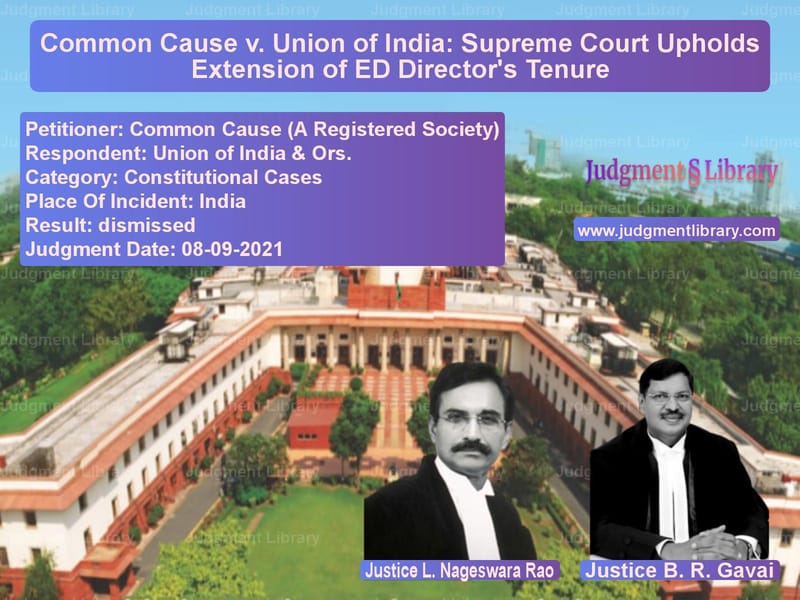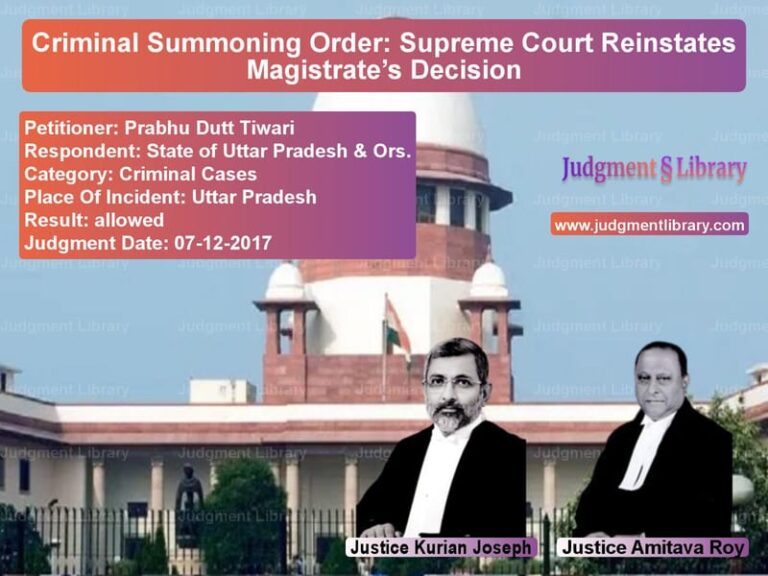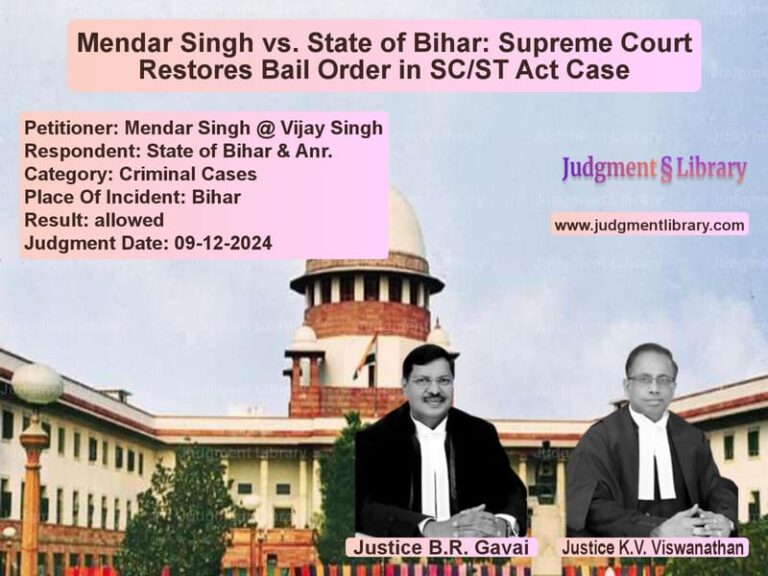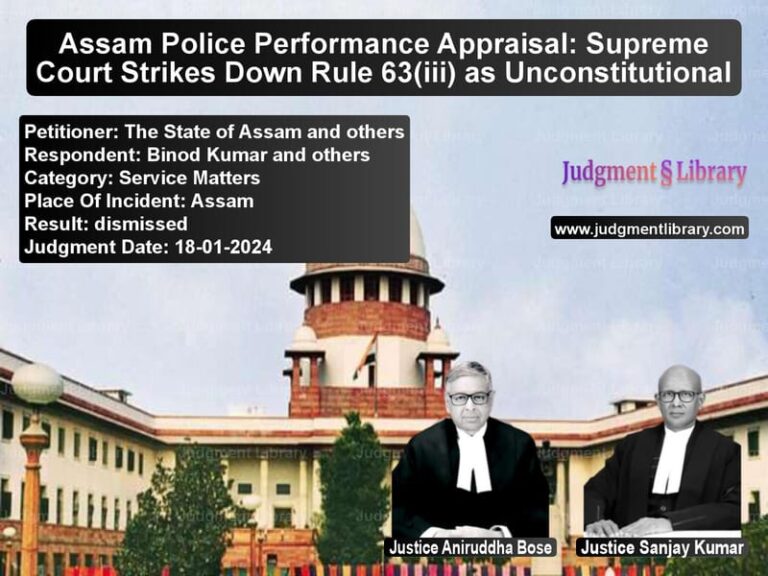Common Cause v. Union of India: Supreme Court Upholds Extension of ED Director’s Tenure
The case of Common Cause v. Union of India was a significant legal battle concerning the tenure extension of the Director of Enforcement. Filed as a public interest litigation (PIL) under Article 32 of the Indian Constitution, the petition sought to quash an order extending the tenure of the Enforcement Directorate (ED) chief beyond the legally stipulated term. The Supreme Court deliberated on whether such an extension was legally valid under the Central Vigilance Commission (CVC) Act, 2003, and whether the government had the authority to amend an appointment retrospectively.
Background of the Case
The controversy stemmed from an office order dated 13.11.2020, which modified an earlier appointment order and extended the tenure of the second respondent, who was serving as the Director of Enforcement. Initially appointed for two years on 19.11.2018, his term was unilaterally extended to three years. The petitioner, Common Cause, argued that this extension was contrary to Section 25 of the CVC Act, which mandates a fixed tenure of two years.
Additionally, the petitioner contended that the extension was unconstitutional because the director had already attained the age of superannuation in May 2020. The primary grievance was that once a person reaches superannuation and no longer holds an equivalent post in government, they are ineligible for tenure extension.
Arguments by the Petitioner
The petitioner, represented by senior advocate Dushyant Dave, raised several key contentions:
- Section 25(d) of the CVC Act prescribes a tenure of “not less than two years” for the ED Director, ensuring protection from arbitrary removal. However, this provision does not imply that an extension beyond two years is permissible.
- Fundamental Rule 56 mandates retirement upon superannuation at 60 years, with exceptions allowed only in explicitly mentioned cases, which do not include the Director of Enforcement.
- The government had no power under the CVC Act to extend the tenure beyond two years, and it could not rely on Section 21 of the General Clauses Act to justify such an extension.
- The move to extend the director’s tenure was “malicious in law” as it was motivated by extraneous considerations rather than necessity.
Government’s Defense
Defending the extension, Solicitor General Tushar Mehta argued that:
- Section 25(d) prescribes a minimum tenure of two years but does not prohibit an extension beyond that period.
- The government retained the authority to modify an appointment order under Section 21 of the General Clauses Act.
- The extension was necessary due to ongoing high-profile investigations that required continuity in leadership.
- The decision to extend the tenure was based on the recommendation of a high-powered committee headed by the Central Vigilance Commissioner.
Supreme Court’s Verdict
The Supreme Court, comprising Justices L. Nageswara Rao and B.R. Gavai, upheld the extension but imposed crucial restrictions:
- The tenure extension was valid as it was based on the recommendation of a duly constituted committee.
- Section 25 of the CVC Act, while ensuring a minimum tenure of two years, does not explicitly bar further extensions.
- Fundamental Rule 56, which governs superannuation, does not override Section 25 of the CVC Act.
- While the extension of tenure is permissible in “exceptional cases,” it should not become a routine practice.
- The Court explicitly barred any further extension beyond November 2021.
Key Observations by the Supreme Court
The Court made several important observations:
“A Director of Enforcement shall continue to hold office for a period of not less than two years from the date on which he assumes office. The tenure ensures the director’s independence and insulates him from executive pressures.”
“Though we have upheld the power of the Union of India to extend the tenure of Director of Enforcement beyond two years, such an extension should only be granted in rare and exceptional cases.”
Implications of the Judgment
The ruling has far-reaching implications:
- It reaffirms the autonomy of the Director of Enforcement while balancing the need for administrative stability.
- It clarifies that tenure extensions should not become a routine practice but should only be granted in exceptional circumstances.
- It restricts future governments from extending the tenure of enforcement officials beyond the legally permitted framework.
- It upholds the validity of the General Clauses Act in modifying government orders but emphasizes that such powers must be exercised judiciously.
Conclusion
The Supreme Court’s ruling in Common Cause v. Union of India underscores the delicate balance between executive discretion and statutory limitations. While allowing the extension of tenure in the present case, the Court set strict guidelines to prevent misuse of such powers in the future. The judgment ensures that enforcement agencies remain independent while preventing undue governmental influence in their administration.
Petitioner Name: Common Cause (A Registered Society).Respondent Name: Union of India & Ors..Judgment By: Justice L. Nageswara Rao, Justice B. R. Gavai.Place Of Incident: India.Judgment Date: 08-09-2021.
Don’t miss out on the full details! Download the complete judgment in PDF format below and gain valuable insights instantly!
Download Judgment: common-cause-(a-regi-vs-union-of-india-&-ors-supreme-court-of-india-judgment-dated-08-09-2021.pdf
Directly Download Judgment: Directly download this Judgment
See all petitions in Fundamental Rights
See all petitions in Constitution Interpretation
See all petitions in Legislative Powers
See all petitions in Public Interest Litigation
See all petitions in Judgment by L. Nageswara Rao
See all petitions in Judgment by B R Gavai
See all petitions in dismissed
See all petitions in supreme court of India judgments September 2021
See all petitions in 2021 judgments
See all posts in Constitutional Cases Category
See all allowed petitions in Constitutional Cases Category
See all Dismissed petitions in Constitutional Cases Category
See all partially allowed petitions in Constitutional Cases Category







